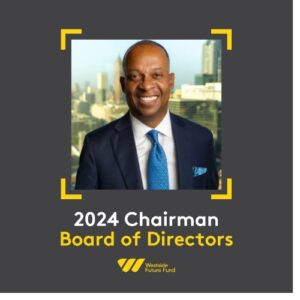For T. Dallas Smith, accepting the role as chairman of the Board of Directors for Westside Future Fund (WFF) was a full-circle moment. Smith grew up in Hunter Hills, off Simpson Road on Child’s Drive. Today, it’s known as Joseph E. Boone. His mother was an entrepreneur, running a daycare in his childhood home. His father, a former paratrooper in the Air Force’s 82nd Airborne division, worked at Lockheed Martin and drove a taxi for Simpson Road Cab Company.
“I was born and raised in the historic Westside, and, for me, it was paradise. I lived in that five-block radius for 14 years and everything I wanted was there,” said Smith. “We had grocery stores, movie theaters, and bowling alleys. For me the conversation isn’t about gentrification, but instead restoration.”
Smith attended EC Clement Elementary and Turner High School before moving to College Park. His family’s move to College Park was his parents searching for “better opportunity,” said Smith. The departure from his childhood home, however, left him with a void – longing for community, or a “gumbo of people” from his neighborhood on Atlanta’s Westside. After his family arrived in their new College Park neighborhood, Smith remembers their white neighbors putting up for sale signs – a personal experience of the “white flight” that was pervasive in Atlanta during the early 1970s.
This early experience of racial prejudice would inform so many moments of Smith’s personal and professional journey and fuel his motivation to become successful. He shares the story of working in a clothing store when he observed a well-dressed woman buying several expensive garments for her husband. He asked about her occupation and was excited when she shared that she worked in real estate, an industry Smith was also interested in pursuing as a career. When he shared his interest with the well-dressed, white woman she replied “You will never make it. You are too you and you’re Black.”
“I always had a mindset that I would be successful and never let what others said deter me. My parents told me I could, and everyone around me, so I believed it,” said Smith. “My whole job here [at T. Dallas Smith and Co.] is to empower my team the same way.”
Smith is now the Founder and CEO of T. Dallas Smith & Company, the largest African American-owned pure tenant rep commercial real estate firm in the U.S. Smith said that mentors like Thomas W. Tift and Herman J. Russell inspired his work, and continue to be a blueprint for the future, especially in giving opportunities to the next generation.
He chronicles his professional journey and personal triumphs in his book In the Black: Changing the Dominant Narrative in the Commercial Real Estate Industry published by Forbes Books.
It is all of these experiences, along with his passion for his childhood community, that led Smith to the work of WFF. Several years ago, Smith was at a networking event and ran into John Ahmann, WFF’s President & CEO. Both men shared they were looking for new homes, and Smith was struck when Ahmann, a white man living in Decatur, expressed interest in moving to Vine City on Sunset Avenue – just down the street from Dr. King’s home. Smith says his conversation with Ahmann, and others at the time, led him to decide it was time to return home to his childhood community. He has since purchased T.M. Alexander’s home on Sunset and is currently renovating the property. During the process of rehabbing the property, Smith met a neighbor who told him the previous owner had promised her a blue sofa that was left behind. Smith was happy to oblige the request and moved it into the woman’s home. After, she thanked him and said, “I’m going to fix you a plate”. It was a phrase Smith hadn’t heard since he left the historic Westside as a teenager. The exchange brought tears to his eyes.
“It made my day. I looked at that woman, straight in her eyes, and I told her ‘You’re the reason I’m moving back to this neighborhood. That spirit,” said Smith. “I want to restore the neighborhood to that place.”
WFF is working to help more people with “live, work, learn” connections be part of this restored Westside. The organization is currently in the midst of its $55 million Our Next Chapter capital campaign to complete its affordable housing targets established in 2017. The philanthropic support will enable WFF to build 285 multifamily units, 225 single family homes, and continue to support legacy residents in its Anti-Displacement Tax Fund. This capital raise twill help the organization unlock key funding from its Impact Fund in combination with public grants to supercharge its efforts to complete high-quality affordable housing in its service footprint. Smith said philanthropic partners are critical for the work of WFF to thrive.
“I think it’s so important for the people and companies writing the checks to be part of something transformational, not just for the city of Atlanta, but for the state of Georgia and the United States of America,” said Smith. “It’s an opportunity to create a model for everyone. This will impact futures that we can’t even imagine.”
Learn more about Westside Future Fund’s signature affordable housing program Home on the Westside. Click here to partner with WFF for Our Next Chapter.

